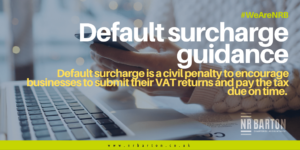In this article we will explain how HMRC apply a default surcharge, how it works and how to avoid them.
- What is a default surcharge?
- What happens if I default?
- How is a surcharge calculated?
- Is there a minimum surcharge?
- Special arrangements for small businesses
- What if I have a reasonable excuse for not paying on time?
- Can I appeal a surcharge?
What is a default surcharge?
Default surcharge is a civil penalty to encourage businesses to submit their VAT returns and pay the tax due on time.
VAT-registered businesses are required to submit their return and make sure that the correct VAT payment has been cleared to HMRC’s bank account by the due date. The due date is shown on your VAT Return and is normally 1 calendar month after the end of the accounting period covered by the return.
You will be in default if by the due date:
- HMRC have not received your VAT Return, this applies even if your return is ‘nil’ or shows a repayment due from HMRC.
- Full repayment for the VAT shown as due on your return has not cleared to HMRC’s account.
What happens if I default?
Each time you default, HMRC will send you either a Surcharge Liability Notice or a Surcharge Liability Notice Extension. Both would be issued at the end of the quarterly accounting period. The surcharge period begins on the date of the notice and ends 12 months from the end of the latest period in default.
If you default during a surcharge period, and there’s VAT outstanding for the tax period in default, HMRC will issue you a surcharge. You will also receive a Surcharge Liability Notice Extension which will extend the surcharge period. If a surcharge is due, you will receive a surcharge assessment.
How is a surcharge calculated?
The surcharge is worked out as a percentage of the VAT that is unpaid at the due date. If you have not sent in your VAT Return HMRC will assess the amount you owe and the surcharge will be calculated as a percentage of that amount.
For the first late payment during a surcharge period, the surcharge will only be 2% of the VAT outstanding at the due date. However, the rate of surcharge will increase progressively to 5%, 10% and 15% for further payments in a surcharge period.
Is there a minimum surcharge?
For surcharges calculated at the 10% or 15% rates, there is a minimum of £30. At the lower rates of 2% and 5%, HMRC will not issue a surcharge if they calculated it to be less than £400.
If the rate of surcharge is less than £400 at rates of 2% or 5%, you will not receive a surcharge but you will:
- Be issued with a Surcharge liability Notice Extension extending the surcharge period.
- Be moved onto the next rate of surcharge if you were to default again within the surcharge period.
Please note that the surcharge is calculated on the amount of VAT not paid on time. This means you may be able to reduce the size of any surcharge or avoid a surcharge altogether by paying as much as you can by the due date.
Special arrangements for small businesses
Special arrangements are in place for businesses with a taxable turnover of £150,000 or less to help when they first have difficulties paying their VAT on time. These businesses will receive a letter from HMRC offering help and support rather than a Surcharge Liability Notice the first time they default.
This system is in place to help small businesses sort out any short-term difficulties before formally entering the default surcharge system. If you default again within the following 12 months, HMRC will issue you with a surcharge liability notice.
What if I have a reasonable excuse for not paying on time?
If you have a reasonable excuse for failing to pay on time, and you resolve this issue without unreasonable delay after the excuse ends, you will not be liable to a surcharge. Please note that there is no statutory definition of reasonable excuse, and it will depend on your individual circumstances which will be evaluated on a case-by-case basis.
Can I appeal a surcharge?
If you disagree with HMRC’s decision that you are liable to surcharge or how the amount of surcharge has been calculated, you can ask HMRC to review your case or have your case heard by an independent tax tribunal.
If you would like HMRC to review your case, you should inform them within 30 days after the Surcharge Liability Notice Extension was sent to you. You do not have to write to HMRC yourself; an accountant or adviser can do this for you, provided that HMRC know that you authorise them to act on your behalf.
If you have any questions about the content in this article, please contact your usual relationship Partner or Manager and we will be happy to help.





